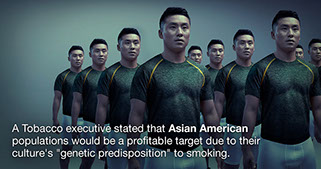
Module 2:
WHO THEY TARGET
Big Tobacco & the Asian American/
Pacific Islander Community
“First Generation Asians are important because they represent potential new smokers.”
- Philip Morris
Targeted marketing to the Asian American community has been influenced by cultural, social, and historical factors. Since the 1980’s, tobacco companies have been researching the diverse Asian cultures in an effort to tailor their marketing campaigns to promote tobacco use within Asian American communities.
Companies believed Asian Americans were a “promising market” because of high population growth, high smoking rates in their countries of origin, and a high brand loyalty to American products.
“Three values/beliefs (family, education, strong work ethic) are important to Asian Americans because they believe they will ultimately result in the achievement of their main objective – to effectively assimilate into U.S. culture/lifestyles. This desire to assimilate leads to a high level of identification with those products and symbols which they view as ‘American.’”
- R.J. Reynolds

Here are a few key historical marketing practices of the tobacco industry:
Push Strategy
Push Strategy
This strategy focused on training Philip Morris employees through their “Cultural Sensitivity Program” to ensure their sales team seemed more approachable to Asian American retailers.
“Philip Morris and other major manufacturers do not understand the Asian culture and lack sensitivity needed to build complete relationships with these retailers. The American objectives is to ‘close the deal fast’ versus the Asian objective of ‘establishing a relationship first.’”
- FraserSmith Marketing Firm
This strategy also created retail materials to help retailers understand Philip Morris’ way of marketing and to “create an appreciation of the potential of Philip Morris products and marketing activities.” Due to the language barriers, these materials mostly contained pictures and graphics to explain their marketing style.
Pull Strategy
Pull Strategy
“Its [Marlboro] broad popularity among Chinese Americans along with its strong American imagery of cowboys, strength and adventure were cited as a direct influence on their choice to smoke that brand.”- Philip Morris
This strategy was aimed at consumer development and targeted the six largest Asian communities by hosting promotional events, brand targeting, events that appealed to youth, and culturally sensitive advertising. Tobacco companies sponsored the Chinese New Year and Vietnamese New Year festivals during the Asian American/Pacific Islander heritage month.
The six Asian American communities that were targeted included:
Chinese
Japanese
Korean
Vietnamese
Filipino
Asian Indian

Corporate Goodwill Strategy
Corporate Goodwill Strategy
This strategy focused on building community support so the Asian American communities would prefer the Philip Morris brand over any other brand. Philip Morris met with community leaders from women’s groups, political groups, arts and culture, and senior citizens organizations to build a positive image for the company.Philip Morris wasn’t the only tobacco company trying to gain political support. In 1993, R.J. Reynolds met with the New York and Southern California chapters of Korean American Grocers Association to help R.J. Reynolds fight increasing excise taxes because it would impact the sale of their tobacco products.
“A special effort should be launched to enlist the support of many minority-owned ‘mom and pop’ retail stores…that could be driven out of business by increasing federal excise tax.”
Sources for this section include the research paper, Targeting of Asian Americans and Pacific Islanders by the tobacco industry and the Truth Initiative.
Say What! EST. 2011
Home | About | Resources | Events | Speak Up | Login
Phone
512.245.8082
Mailing Address
Texas School Safety Center
ATTN: Say What Program
Texas State University
601 University Drive
San Marcos, TX 78666

Say What! was created and designed by young people from across Texas and connects students interested in eliminating tobacco from their schools and communities. The Say What! movement is funded by the Texas Department of State Health Services through a contract with the Texas School Safety Center at Texas State University.





